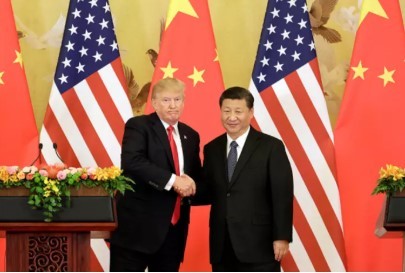Tv & Film
China Cuts Hollywood Films After Trump’s 125% Tariffs
China Slashes Hollywood Film Imports in Response to Trump’s 125% Tariffs: Global Trade Tensions Intensify.

China has taken a sharp retaliatory step in the escalating trade war with the United States, announcing a significant cutback on the number of Hollywood films allowed into its cinemas. The move comes just days after former President Donald Trump imposed a harsh 125% tariff on Chinese goods, reigniting tensions between the world’s two largest economies.
This latest development marks a striking expansion of the U.S.-China trade conflict, which has already disrupted global financial markets and strained diplomatic relations. Now, the battle is being waged not only through tariffs and manufacturing but also through cultural and entertainment exchanges.
Hollywood Feels the Heat
In a bold statement issued by China’s Film Administration, officials declared a “moderate reduction” in the importation of American films, citing growing dissatisfaction among Chinese audiences over U.S. government policies.
"The wrong action of the U.S. government's indiscriminate tariffs on China is bound to further reduce the favorable impression of domestic audiences on American films," the administration stated.
Although China already imposes annual quotas on foreign films—typically allowing about 34 international blockbusters to be shown in theaters—this latest move will reduce even those limited opportunities for U.S. studios to access the lucrative Chinese box office, the second-largest in the world after the U.S.
This comes as a blow to major American studios such as Disney, Warner Bros, Universal, and Paramount, which rely heavily on international markets to maximize profits for high-budget productions. Many Hollywood films, particularly action-packed franchises, have been tailored to appeal to Chinese audiences in recent years.
Despite the current restrictions, Warner Bros. and Legendary Pictures' “The Minecraft Movie” managed to secure a Chinese release last weekend, grossing around $14.5 million. However, industry insiders fear such releases will become rarer as Beijing tightens its grip.
Trade War Escalates Amid Trump’s Tariff U-turn
The decision to slash Hollywood film imports follows Trump’s dramatic imposition of a 125% tariff on Chinese imports—up from the previous 54%. The former president simultaneously issued a temporary 90-day pause on similar tariffs aimed at other global trade partners, sparking confusion and volatility across international markets.
Although Trump framed the move as a strategic win for the U.S., the immediate fallout included a sharp decline in global stock prices, followed by a historic rebound. Wall Street saw its third-largest single-day rally since World War II after Treasury Secretary Scott Bessent helped restore investor confidence.
"What a day, but more great days coming!!!" Trump wrote on Truth Social following the economic turnaround.
However, the sharp tariffs on China remained in place, with Trump accusing Beijing of showing a "lack of respect" in trade negotiations. In response, Chinese officials described the tariffs as “bullying” and vowed to resist what they called "extreme pressure" from Washington.
Beijing’s Long-Term Strategy: Economic Retaliation
Chinese authorities have made it clear they are preparing for what they call a “prolonged economic warfare” with the United States. Reports from within the Chinese government suggest that Beijing has spent years insulating itself from potential U.S. economic aggression by strengthening trade ties with other nations and building industrial infrastructure.
One key element of this strategy involves the use of China’s vast $1.9 trillion network of new manufacturing facilities to flood global markets with inexpensive goods. Analysts warn this could threaten the survival of foreign manufacturers across several sectors, including consumer electronics, textiles, and automotive parts.
Beijing’s selective targeting of the Hollywood film industry is seen as both symbolic and strategic. It sends a cultural message while striking at a soft power pillar of American influence. Additionally, it allows the Chinese government to promote domestic films and reduce foreign cultural exposure amid rising nationalism.
A Global Ripple Effect
As trade tensions rise between China and the United States, other countries are watching closely. With Trump’s blanket tariffs on hold for 90 days for most trading partners, U.S. allies are seeking clarity on future policy directions. Economists caution that the uncertainty could hinder global investment and consumer spending, especially if the standoff between Washington and Beijing intensifies further.
Hollywood executives, meanwhile, are reportedly scrambling to understand how the Chinese restrictions will impact upcoming releases. Major studios had lined up several blockbusters for 2025 with hopes of global box office success, including in China. Now, those projections are being revised.
The Chinese government’s decision to slash Hollywood film imports marks a sharp escalation in the ongoing U.S.-China trade war, extending the conflict into the realm of entertainment and cultural diplomacy. As Trump’s tariff strategy triggers backlash, the world is bracing for a new phase of global economic uncertainty—one where politics, profits, and pop culture are becoming increasingly intertwined.
With Beijing vowing not to back down and the former U.S. president doubling down on his confrontational trade policies, the stage is set for further economic and cultural clashes between the two superpowers.

Jennifer Lopez looks ageless in a towel in no-makeup video

Amanda Holden spanks her derriere and thanks Spanx

Amanda Holden shows off more than bargained as she dances around in her outfit of the day

Italian models Giulia Salemi and Dayane Mello looks glam

Meet Harley Cameron, the stunning model who went from a BKFC ring girl to become a pro wrestler and found love

GreenGirlBella, Rocks Emirates Stadium in Painted Home Kit

Amanda Holden calls herself a 'good girl' in white dress with 'cheeky' split

Mum slammed by parents after flashing thong in school run outfit

Lottie Moss makes jaws dropp as she shows off her flawless body








Comments
Written news comments are in no way https://www.showbizglow.com it does not reflect the opinions and thoughts of. Comments are binding on the person who wrote them.